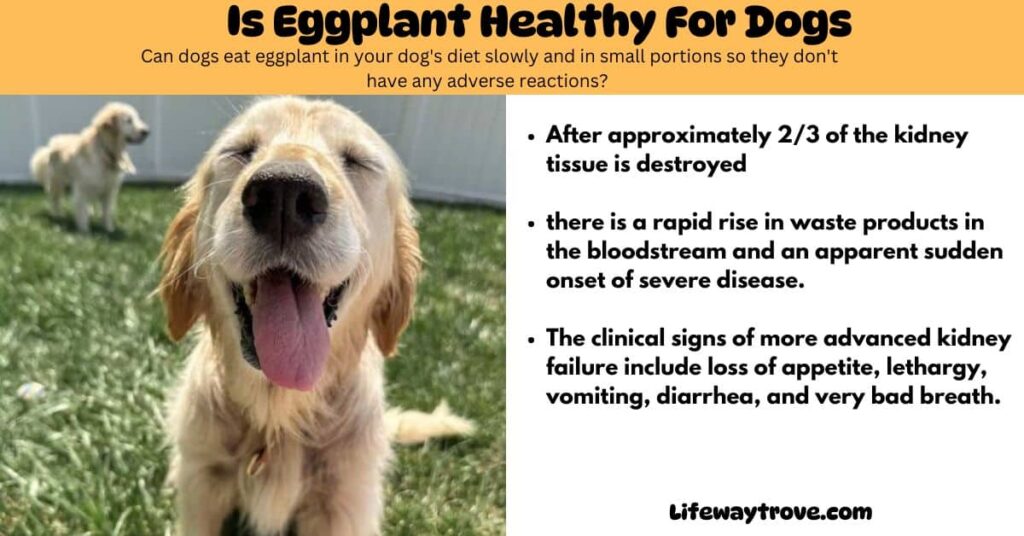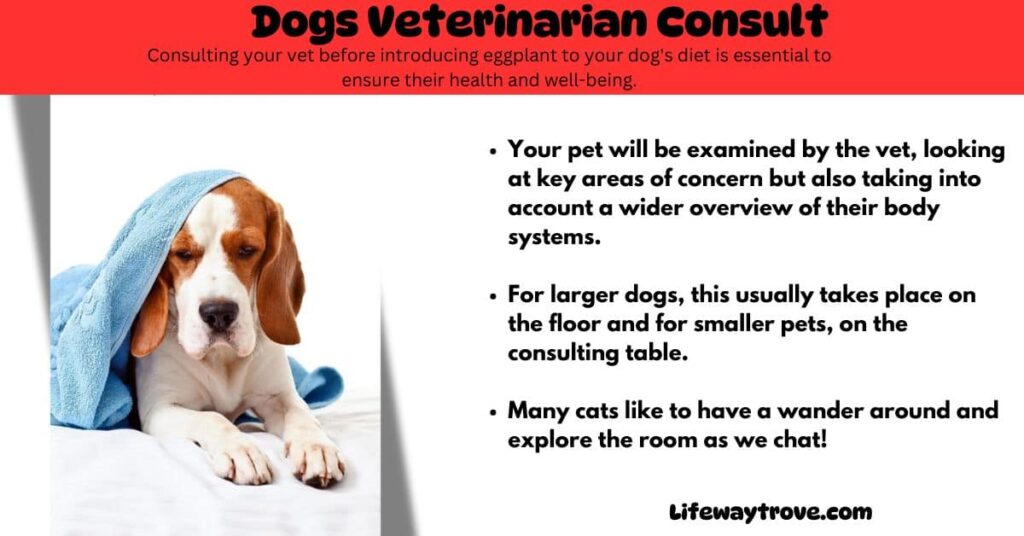Can dogs eat eggplant? Dogs, known for their varied palates and occasional curiosity about human food, may encounter eggplant in various contexts. Whether it’s the aroma wafting from your kitchen or a tempting peel on the floor, dogs can take an interest in this purple vegetable. But before you share your plate of eggplant with your canine companion, it’s essential to understand the potential risks and benefits associated with feeding eggplant to dogs. From digestive concerns to nutritional value, there are several factors to consider when introducing eggplant to your dog’s diet.
This exploration will explore whether dogs eat eggplant safely consume eggplant, how to prepare it, potential health considerations, and expert guidance on including eggplant in your dog’s diet. So, if you’ve ever wondered if your pup might enjoy the taste of eggplant, join us as we uncover the answers together.

Understand The Risks and Benefits
-
- Digestibility: Eggplant contains selinene, a natural compound that can be difficult for some dogs to digest. This compound is more concentrated in the leaves and stems of the eggplant, so it’s essential to remove these parts before feeding them to your dog.
-
- Allergic Reactions: Like humans, dogs can develop allergies to certain foods, including eggplant. While eggplant allergies in dogs are rare, monitoring your dog for any signs of an adverse reaction after consuming eggplant for the first time is essential.
-
- Potential Gastrointestinal Upset: Some dogs may experience gastrointestinal upset, such as vomiting or diarrhea, after eating eggplant.

Can Dogs Eat Eggplant And Tomatoes?
-
- Nutritional Value: Despite the risks, eggplant does offer some nutritional benefits for dogs. It is low in calories and contains fiber, aiding digestion and promoting a feeling of fullness. Additionally, eggplant is a good source of vitamins C and K and potassium.
-
- Variety in Diet: Adding eggplant to your dog’s diet can provide variety and introduce new flavors and textures. However, it should only be given as an occasional treat and not as a staple food. Can dogs eat eggplant? While dogs can safely consume eggplant in moderation, it’s essential to be mindful of potential risks, such as digestive issues and allergic reactions. Before introducing eggplant into your dog’s diet, please consult with your veterinarian to ensure it is suitable for your dog and to receive personalized feeding recommendations. Additionally, always prepare eggplant properly, remove any parts that may be difficult for your dog to digest, and monitor your dog for any adverse reactions after consumption. With careful consideration and moderation, eggplant can be a tasty and nutritious addition to your dog’s diet.
Is Eggplant Harmful To Dogs?
It’s essential to be aware of the potential risks and take the necessary precautions when feeding eggplant to dogs. Here is a detailed description of potential risks and precautions:Digestive problems
Eggplant contains selinene, a natural compound that can be difficult for some dogs to digest, especially if eaten in large quantities or raw form. Can dogs eat eggplant thoroughly before feeding it to your dog. Cooking helps break down tougher fibers, making them easier for your dog to digest. Additionally, remove the stems and leaves, which contain high concentrations of selinene.Allergic reactions
Although uncommon, dogs can be allergic to Can dogs eat eggplant, causing symptoms such as itching, swelling, digestive upset, or even more serious reactions. Introduce eggplant to your dog’s diet slowly and in small amounts. Monitor your dog closely for any signs of an allergic reaction after eating. If any adverse reactions occur, stop feeding eggplant and consult your veterinarian.Gastrointestinal upset
Some dogs that eat eggplant may experience gastrointestinal upset after eating eggplant, such as vomiting, diarrhea, or gas.
Toxic ingredients
Although eggplant flesh is generally safe for dogs, other parts of the plant, such as the leaves and stems contain high concentrations of selinene, which can be toxic if eaten in large amounts. Only feed eggplant flesh to your dog and ensure that all stems and leaves are removed before preparation.Veterinary advice
Consult your veterinarian before introducing Can dogs eat eggplant or any new food to your dog’s diet. They can provide guidance based on your dog’s individual health status, dietary needs, and any specific considerations. You can safely include eggplant as an occasional treat in your dog’s diet by being aware of these potential risks and taking proper precautions. However, always prioritize your dog’s well-being and consult your veterinarian with any concerns or questions.Is Eggplant Healthy For Dogs? Healthy Ways
Including Can dogs eat eggplant in your dog’s diet can be a healthy addition, but some considerations must be kept in mind. Here are some safe and healthy ways to include eggplant in your dog’s diet. Please make sure the eggplant is thoroughly cooked and peeled before feeding it to your dog. Raw eggplant is difficult for dogs to digest and can cause gastrointestinal upset. Serve plain cooked eggplant without seasoning or additives. Spices like garlic and onions can be toxic to dogs. Can dogs eat eggplant in your dog’s diet slowly and in small portions so they don’t have any adverse reactions? You can mix cooked and chopped eggplant with your dog’s regular food, adding variety and nutrition to his diet. You can also make dog food at home using cooked can dogs eat eggplant your dog’s diet slowly and in small portions so they don’t have any adverse reactions. Many recipes for dog-friendly meals include eggplant.
Is Eggplant Good For Dogs With Kidney Disease?
Before making significant changes to your dog’s diet, it’s always a good idea to consult with your veterinarian. They can provide personalized advice based on your dog’s needs and health status. Remember that eggplant can be a healthy addition to your dog’s diet in moderation, but it should not replace their regular balanced dog food.Avoid Seasonings
Of course, it’s important to avoid using any spices or seasonings when preparing can dogs eat eggplant for your dog. While we may enjoy seasoning our food for flavor, many spices can be harmful to dogs. For example, garlic, onion, and some herbs commonly used in spice mixes can be toxic to dogs and should be strictly avoided. When preparing eggplant for your dog, can you keep it simple? Here’s an essential guide to preparing eggplant for your furry friend: Cook the can dogs eat eggplant thoroughly by boiling, steaming, or baking. Avoid frying, as it can add unnecessary fat and calories. Peel the eggplant before cooking. Eggplant skin is difficult for dogs to digest. Serve your dog eggplant in small portions, especially if it’s their first time. It helps prevent possible digestive upsets. Mix cooked and peeled eggplant into your dog’s regular meals to add variety and nutrition. After introducing eggplant to your dog’s diet, monitor them for allergic reactions or digestive issues. Stop feeding eggplant and consult your veterinarian if you notice any adverse reactions. By following these guidelines and keeping eggplant simple, you can safely include it in your dog’s diet as a healthy occasional treat or addition to their meals.Monitor Your Dog’s Reaction
When introducing new foods to your dog’s diet, such as eggplant, it is crucial to closely monitor their reaction. Watch for any changes in behavior or physical symptoms that may indicate a negative reaction to the new food.
Consult Your Veterinarian
Consulting your vet before introducing eggplant to your dog’s diet is essential to ensure their health and well-being. Here’s why it’s important to seek professional advice and what you can expect during a consultation: Your veterinarian knows your dog’s medical history, including existing health conditions, medications they are taking, and previous allergic reactions. Before including eggplant in your dog’s diet, your veterinarian will perform a thorough health evaluation to determine if it is safe for your pet. This evaluation may include a physical exam, blood tests, or other diagnostic procedures.












Leave a Reply